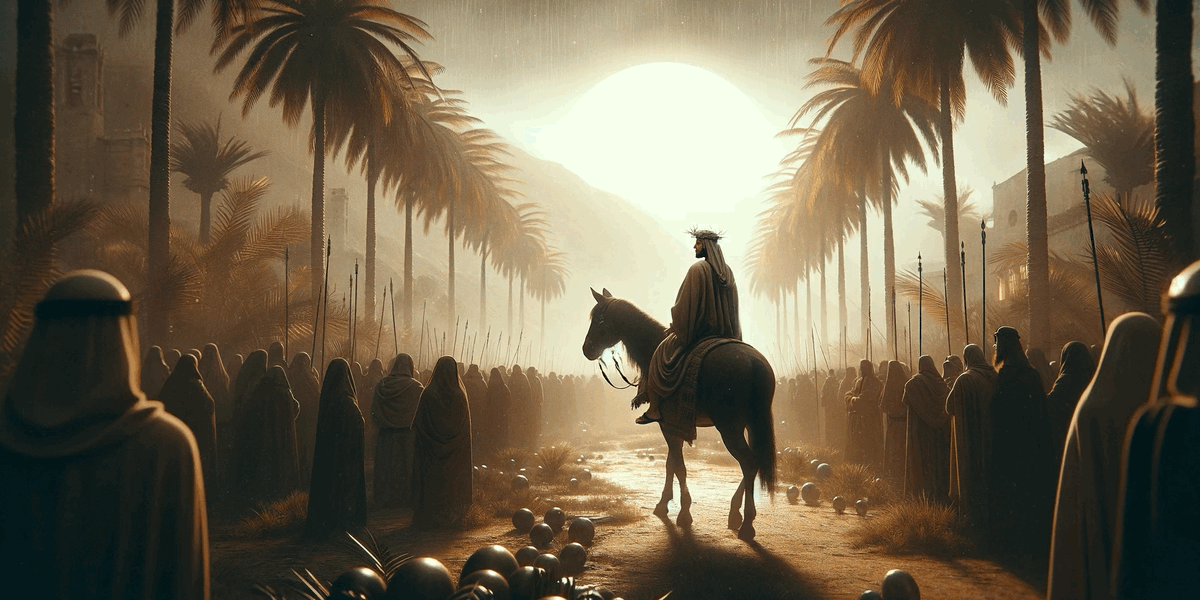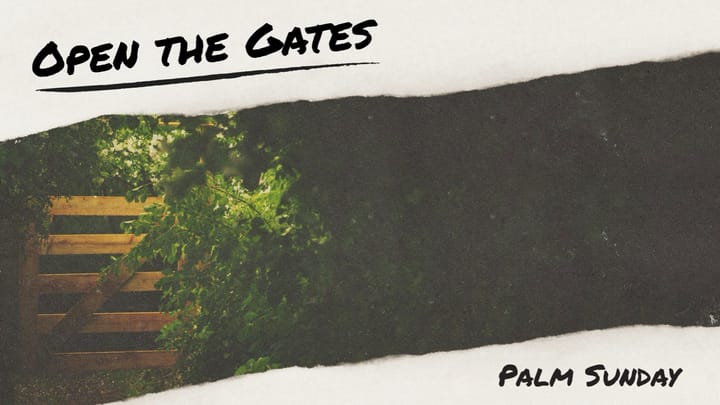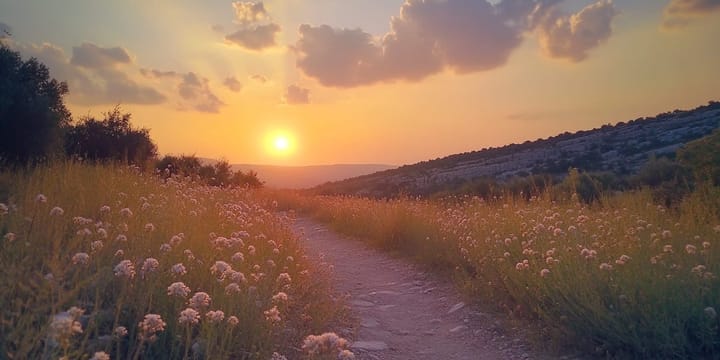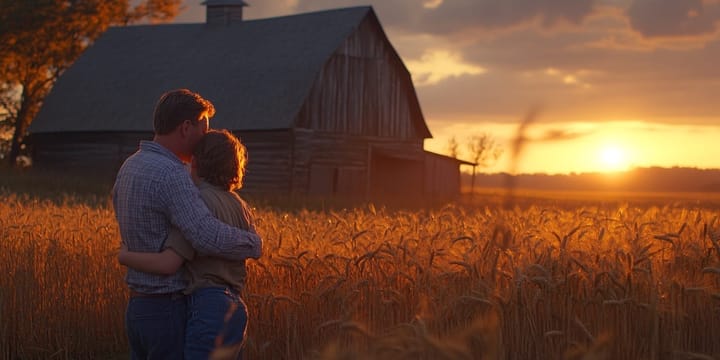Fairhaven Sermon 3-24-2024
This week's sermon by Pastor Dylan Parson on Palm Sunday reflects on the unique, anticlimactic nature of parades and Jesus' subversive entry into Jerusalem, challenging contemporary expectations of kingship and victory.

This week's sermon by Pastor Dylan Parson, reflects on the unique and somewhat anticlimactic nature of parades, drawing a parallel with the biblical narrative of Jesus' entry into Jerusalem on Palm Sunday. The speaker reminisces about the excitement and joy parades brought during childhood, noting their ability to temporarily suspend the normal order of life, bringing communities together in celebration. This nostalgic journey through various parades, including those of Slippery Rock's homecoming and Harrisville Memorial Day, sets the stage for a deeper exploration of the Palm Sunday event, where the ordinary spectacle of a parade is infused with profound theological significance.
The sermon delves into the Gospel of Mark's account of Palm Sunday, highlighting its distinct lack of triumphalism compared to other gospel narratives. Instead of portraying a victorious entry, Mark's version is noted for its absence of palms and the subsequent anticlimactic end to Jesus' procession. This is contrasted with the expected norms of a victory parade, drawing an analogy to the absurdity of Jesus riding a colt as a deliberate subversion of royal and military pomp. The preacher interprets this as Jesus challenging contemporary expectations of kingship and victory, illustrating a king who mocks worldly power through humility and service. Despite the lack of a grandiose conclusion to the parade, the crowd's acknowledgment of Jesus as the Messiah highlights a moment of recognition and celebration of divine presence, albeit within an unconventional and seemingly disappointing framework.
Transcript
Parades, and I think what we're talking about on Palm Sunday is a parade, are a really interesting sort of phenomenon whenever you start to think about it a little bit. The entire point of a parade, really any sort of public procession or protest, you know, the point of a parade is that the day-to-day order of things is briefly suspended, you know, disrupted. And that's sort of what makes them attractive, right? Really miserable, kind of like a party is a party because it's different. I'm sure the St.
Patrick's Day parade downtown is lovely, but it is disruptive, right? I don't want to really make the trek down there, and I haven't, because of the way it ensnares the city. At Spencer, it's on our agenda next council meeting to approve the Brentwood Fourth of July parade. They always use the parking lot in the building they have for years, because that's coming up. And I would also really like to see the Brentwood Fourth of July parade, but coming from Allentown, I suspect it would take me the better part of an hour to get there.
And then if I find a place to park, parade's probably over. But when I was young, some of my favorite, absolute can't-miss events of the year were parades. They're one of the most joyful, magical occasions for a kid, because it is such a difference. You're allowed to play along the road, for example, right? And all kinds of fascinating vehicles and floats and marchers roll past.
Everyone from the fire chief to the mayor to the Butler County junior dairy princess, you know, smiles and waves, throws you a handful of Tootsie Rolls. And it's better than trick or treat, because the candy comes to you. In the fall, usually just when you'd start to feel a real chill, that's Slippery Rock's homecoming parade, which featured very excitingly for me. I still remember the purple uniforms of the Carn City Marching Band.
You saw them coming from a long ways away. Pine Township in Mercer County has these lime green fire trucks. It's always very exciting seeing it all march up Main Street. And for weeks in advance of homecoming, all the businesses up and down the street are painted in the year's themes.
All of the fraternities and sororities paint windows, all the organizations at the university. It feels like a major festival. And on the other side of the calendar, in the spring, often on one of the first hot days of the year, is the Harrisville Memorial Day Parade. I'd watch many of my classmates and their dads and grandfathers chuck down Route 8 on their antique farmhalls.
They'd crawl past, pour in diesel smoke, and then would come those other Shriners and their little cars zipping back and forth around the street. And the Memorial Day Parade ends in front of the ice cream shop. The crowd begins to migrate over to the cemetery. And then two ninth graders were selected every year to read the Gettysburg Address and then in Flanders Fields.
And the short remembrance ceremony, that probably was like 15 minutes, that would conclude shortly thereafter, and then we'd go home. And my recollection of the end of a parade is it's always a weird feeling once it dissipates. The festivities drawing to a close. It's almost like coming out of like a daydream or a distraction.
Motor traffic starts flowing again. Route 8 is a state highway. It was just a slow march, but now it's 45 miles an hour, semi trucks instead of a procession, and the world snaps out of it. The temporary suspension of everyday life goes back to normal.
Where hundreds of people were gathered a few minutes before. There was celebration in the streets. There was candy flying through the air. Now you just have cars flying past.
You would never know that something was happening a couple minutes ago. It's always, always anticlimactic. And I think this is the same feeling that marks the end of Jesus' entry into Jerusalem. There's a sense of snapping out of the moment and then into a kind of, almost kind of eerie, well, now what? What's next? The story of Palm Sunday is in all four gospels, which is kind of unusual.
You don't see a lot of stuff that's in all four. But what characterizes Mark's gospel version in particular is that this royal parade, this procession is just completely anticlimactic. I'll bet you didn't notice. You can go back and check if you want to.
But during the reading, you might not have noticed that there are no palms to be found in Mark's version. Mark says they cut down branches in the fields and they're waving branches, leafy branches, but no palms. And palms were a very specific symbol of a victory, kind of like a laurel crown in the ancient world there. And palms then, you'd think they must imply something that Mark's not trying to say.
Maybe Mark's not trying to say this is a victory parade at all. Not yet. And beyond that, another thing about Mark is Mark doesn't mention that Jesus' entry into Jerusalem causes any kind of problem. You know, in Matthew and Luke and John, they say that Jesus' arrival on the back of a cult causes the city to erupt in this frenzy, positive and negative.
It fills the Pharisees with this sense of rage and despair and they start plotting against Jesus. The other Gospels, they have this as a moment where Jesus is really picking up momentum. The Palm Sunday procession is kind of the beginning of something big that's clearly about to happen. You know, there's like a revolutionary kind of aspect to it.
You picture what Paris would have felt like before the storming of the Bastille, right? Or St. Petersburg before the Russian Revolution. Something's building. That momentum is very clear in these other three Gospels.
The crowds chant Hosanna and the Pharisees start to shake and tremble and worry. They start to turn to Rome for help. Things are starting to build. It's getting really uncomfortable.
And in those three other Gospels, in their telling, Jesus' next move after he comes into the city on the back of the cult, he goes to the temple. That's when he makes his whip. He cleanses the temple. He flips over all the tables, purifies it.
He's flexing the authority that God has given him, that his Father has given him in the holiest place of his people. But again, not in Mark. That's not what we read today. In Mark, the cleansing of the temple happened chapters ago.
It happened just kind of as a standalone event by itself. And on Palm Sunday, Mark doesn't really seem to be telling us about a triumphal entry. We don't have all of these things that we picture being there. They're really not there.
At the very least, he's describing a different kind of victory parade that the people of Jerusalem would have ever seen. It's almost satirical. The great preacher Chuck Campbell points out that the Palm Sunday story seems to be something that Jesus has put together as this very elaborate public drama, like a performance art piece. He points to the amount of time that Mark spends.
And again, if you go back to the passage, you'll see this. He points to the amount of time that Mark spends talking about Jesus sending the disciples to go get the colt for him to ride. Half the verses in the story we read this morning are Jesus telling the disciples about what to do with the colt, and if anyone talks to you about it, there's just this elaborate kind of pre-planning. This is super well-planned.
It's choreography. Jerusalem is a stage here for Jesus to show something. Emperor Caesar or his representatives or his generals, they would roll into Jerusalem after a military victory on the back of a great war horse. The city's great dignitaries are offering their praise and their honor.
Everyone's shouting, Hooray! Palms are being strewn on the ground left and right. A Roman leader coming into town would ride with a stern look on his face. He'd be wearing that laurel crown of victory on his head. He'd proudly wave to the gathered crowd that's come to admire him.
Jesus is not on a war horse at all, but a colt, a baby horse. You can envision his sandals dragging along the stones of the street. It's an intentionally goofy image. Picture a grand parade up Pennsylvania Avenue towards the Capitol in the background.
The guest of honor leading the parade is a grown man pedaling a 12-inch kid's bike. That's the kind of thing that we're seeing here. Jesus is doing all of this completely on purpose. You think you know what a king looks like, do you? You think you know how a king acts.
Well, guess again, because it's this. This whole thing is a joke. It's making fun of Caesar and Pontius Pilate and King Herod, all these so-called great men who are soon unmasked to have no power. They're nothing compared to this poor carpenter from Jesus.
And Jesus, starting now and going through the rest of this week, washing feet, hanging on a cross, is going to show what a real king does. But the miracle of Palm Sunday, I think, is that a crowd follows him anyway. This purposely silly procession, this guy on the little horse, is also somehow dead serious. I mean, he does get a crowd around him shouting, Save us! Even if it's just for this brief window, even if it's completely evaporated by Maundy Thursday and Good Friday, many people right now are seeing the face of God in Jesus, and they know it.
They may not understand it, but they know it's him. So Hosanna! Save us! they cry, unable to help themselves. They're crying out to him. Blessed is the one who comes in the name of the Lord.
In this guy, who's essentially acting like a jester, a jester, ridiculing the greatest powers the world has ever seen, they see this is the one that God has sent. They know that this is the guy they've been waiting for, even as this all looks crazy. And in a new sort of way, Jesus and his followers burst into public life. They briefly fill the streets.
All this craziness fills the streets. And I have to imagine it was kind of uncomfortable for everyone involved. In the same way that there's a real discomfort between the participants and the passers-by in a Good Friday cross procession, if you've ever been to one, even today. That's always been my experience at those.
There's like a tension in the air whenever the church is doing something in public. There's the participants carrying the cross down the street, which is not something you normally do, right? And with the viewers, the people that aren't involved, you have to think they're wondering it. You weirdos can believe what you want, but do you have to do it out here? And the crowd that follows Jesus must be similarly self-conscious. That they're a disruption.
They're doing something weird. Everyone else sees them fawning over some strange man on a little horse, looking like an absolute fool, but they're out there anyway. Because they know that this is the one that they've been waiting for. They're willing to follow, no matter how it looks, because they know.
And yet the parade comes to an end, like any parade does, and it's weird. The laughter, the lively conversation, the singing, the hosannas, the children's shouts of joy give way to the everyday returning. Same as those tractor trailers starting to roll down Route 8 once more as the police barricades lifted. And Jesus, it seems, just goes home.
Listen to how disappointing this is. Really feel how disappointing this story ends. This is Mark 1 11. Jesus entered Jerusalem and went into the temple.
After he looked around at everything, because it was already late in the evening, he returned to Bethany with the twelve. All this, and that's it. This whole ordeal, this grand satire, this great rabble that's following the one that they'd crown as king into the capital. Jesus slides off the back of the colt.
He walks into the temple. He looks around. And then he tells the disciples, Well, you know, it's getting kind of late. You probably should go home.
And that's it. He looks around and he goes home. This grand entrance that is certainly building up to something, right? It doesn't. There's just a complete un-grand turning around.
Complete anticlimax, complete disappointment. And this is also part of the show. Jesus has mocked the generals. He's mocked the governor.
He's mocked the king. He's mocked the emperor. And now this adoring, joyous, hosanna-shouting crowd, whatever they expected to happen, he's mocked that expectation too. You think you know what a king looks like.
You think you know what a king does. Well, you're wrong too. It turns out they don't get it. Not really.
They see him. They know who he is, but they don't really get it. Jesus is not going to be crowned today. The Messiah is not going to take the reins of the throne of David.
And no matter how many hosannas fill the streets, no matter how many shouts echo in the city, the crowd goes home. They're days like kids at the end of a parade when the fire trucks stop. And the real royal coronation, the real triumphal entry comes on Friday. Precious has to nod up the temple mount, not this time, but a different hill.
But this time, they and we won't know what we're looking at. The face of God that was so clear on Palm Sunday becomes a lot less appealing on Good Friday. We won't join that parade. No one's going to join that parade.
And yet we look forward to that day. The name of the Father and the Son and the Holy Spirit. Amen.


